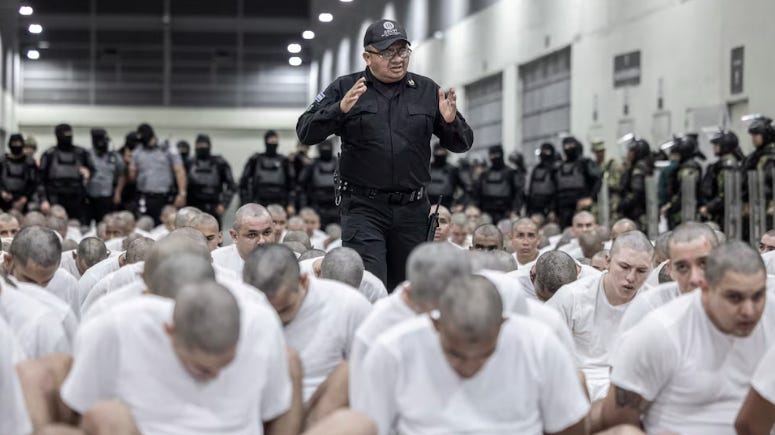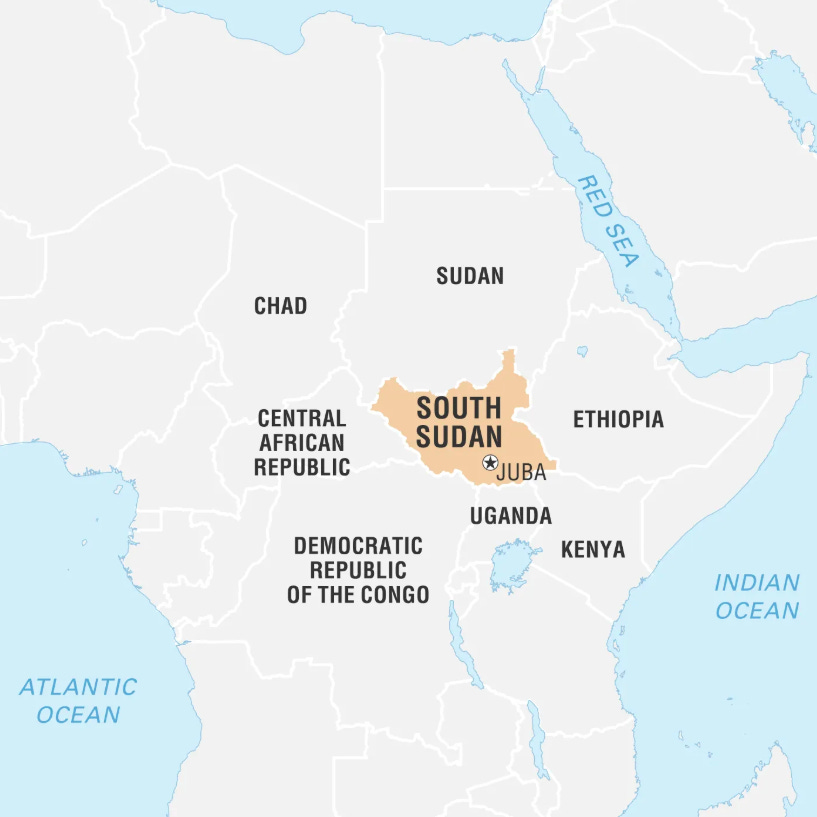One Story for the Public, Another for the Courts
The Trump administration's contradictory statements on immigration
When selling its immigration crackdown to the public, the Trump administration often makes fiery claims. It says that those being deported are "gang members," “terrorists,” and "cold-blooded criminals." It blames “activist judges” for standing in the way. It admits no error.
But in court, government lawyers have contradicted the administration’s media messaging. The contrast doesn’t just risk confusing the public. It raises concerns about government honesty and accountability.
Due process for “alien enemies”
The Trump White House has made its public stance clear: when it calls people terrorists and has them deported, they shouldn’t expect due process.
That was the theme when 238 Venezuelan men, who were in the country without authorization, were deported to a prison in El Salvador. The administration said they were members of Tren de Aragua, a violent gang that the State Department has labeled a terrorist organization directed by the Venezuelan government. To justify their removal, the administration invoked the Alien Enemies Act (AEA), a law from 1798 that allows the president to detain and remove people from a country that has invaded the United States or with which the US is at war.
Some of the men denied they were members of Tren de Aragua, but they were given no opportunity to challenge their deportation in court. “If you illegally invaded our country the only ‘process’ you are entitled to is deportation,” Trump adviser Stephen Miller later wrote on X.
But in legal arguments, the administration took a different stance.
The ACLU sued to stop the administration from using the AEA to remove the Venezuelans, and a federal judge temporarily blocked the deportations from proceeding. (The men were removed anyway, possibly in defiance of the judge’s order.) The administration then appealed to the Supreme Court to let AEA removals continue.
In a brief for the Court, Acting Solicitor General Sarah M. Harris wrote that “the AEA does not foreclose all opportunity to test the legality of alien-enemy detention.” In other words, she admitted that, under the AEA, people still have the right to challenge their detention in court. This was the opposite of what Miller had claimed, and at odds with the White House’s decision to remove the Venezuelans without granting them a court hearing.
The Supreme Court later affirmed that they were entitled under the Fifth Amendment to receive notice of their impending removal and an opportunity to contest it. But for the 238 men now imprisoned in El Salvador, it was too late.
The administration even contradicted itself about whether it had defied the courts. “We’re not stopping,” Trump border czar Tom Homan declared on television a couple of days after the Venezuelans were removed. “I don’t care what the judges think. I don’t care what the Left thinks. We’re coming.”
But in later court documents, government lawyers were far more circumspect. “There is no basis for the suggestion of [government] noncompliance with any binding order,” the DOJ legal team said in a court filing related to the case. They seemed to have forgotten Homan’s defiant remark.
The case of Kilmar Abrego Garcia
Kilmar Abrego Garcia was under a “withholding of removal” order that said the government was not allowed to deport him to El Salvador, where he might face harm because his family had been targeted by gangs. But he was sent there anyway — something that a government lawyer admitted was an “administrative error,” according to sworn testimony in March.
Stephen Miller again told a different story in public. “Nobody was mistakenly deported anywhere,” he said. “That’s a big fact that all of you, most of you, have gotten wrong. No one was mistakenly sent anywhere.” And Vice President JD Vance suggested on X that Abrego Garcia was a gang member (something Abrego Garcia denies) and could be deported because he had been given previous deportation hearings. But Vance was begging the question, since those hearings had resulted in the order that Abrego Garcia not be removed to El Salvador.
As for the government’s own admission of error, Miller had an audacious way of dismissing it: he claimed falsely that the admission was itself a mistake: “The only mistake that was made is a lawyer put an incorrect line in a legal filing.” The administration even fired the attorney who had owned up to the error.
The White House publicly contradicted its court statements in another way. The Supreme Court ordered the government to facilitate Abrego Garcia’s return to the US. This was contrary to the administration’s wishes at the time — Solicitor General D. John Sauer argued that the government did not have the ability to bring Abrego Garcia back: "The United States does not control the sovereign nation of El Salvador, nor can it compel El Salvador to follow a federal judge's bidding."
Yet in public, President Trump later said just the opposite. In an April 29 interview with ABC News, he admitted that he could bring Abrego Garcia back just by calling the president of El Salvador.
A federal judge noted the administration's inconsistency. At a May 7 court hearing, a government lawyer repeated the claim that the US did not have the ability to return deportees from El Salvador. District Judge James Boasberg was incredulous. “Didn’t the president say just last week that he could secure the return of Mr. Abrego Garcia simply by picking up the phone and asking the president of El Salvador to release him?” he asked. “Was the president telling the truth?”
Apparently Trump was: on Friday, Abrego Garcia was brought back to the US to face criminal charges that he was part of a conspiracy — along with at least six unnamed co-conspirators — to transport undocumented immigrants across the country for financial gain. So if the administration had the power to bring him back after all, why did it claim repeatedly in court that it couldn’t?
Abrego Garcia’s attorney raised that concern after the indictment. “The government disappeared Kilmar to a foreign prison in violation of a court order,” Simon Sandoval-Moshenberg said. “Now, after months of delay and secrecy, they’re bringing him back, not to correct their error but to prosecute him. This shows that they were playing games with the court all along. Due process means the chance to defend yourself before you’re punished, not after.”
The Justice Department launched its investigation in April, around the same time the Supreme Court ordered Abrego Garcia’s return to the US. It began with a closer look at a 2022 traffic stop by the Tennessee Highway Patrol, when officers pulled him over for speeding in a van with eight other men.
At the time, the police officer who stopped him let him off with a warning for driving with an expired license. But the new investigation expanded into a broader case, and the indictment accused him of a conspiracy involving transporting thousands of noncitizens over nearly a decade — allegedly including ties to the Salvadoran gang MS-13. None of the alleged co-conspirators have been charged, or named.
Trump, for his part, told reporters aboard Air Force One that the decision to return Abrego Garcia was made by the Justice Department, not him. “He should have never had to be returned, take a look at what’s happened with him. You take a look at what they found in the grand jury, and everywhere else,” he said.
At a Friday press conference, Attorney General Pam Bondi thanked Salvadoran President Nayib Bukele for agreeing to send Abrego Garcia back to the United States. “Our government presented El Salvador with an arrest warrant and they agreed to return him to our country,” Bondi said.
Abrego Garcia’s attorney called the charges “an abuse of power.”
"They'll stop at nothing at all – even some of the most preposterous charges imaginable – just to avoid admitting that they made a mistake, which is what everyone knows happened in this case," Sandoval-Moshenberg said.
On Sunday night, Garcia’s lawyers filed court papers arguing that the Trump administration should still be held in contempt of court even though Garcia has returned to the US. The case had originally been brought in Maryland by Garcia’s family as a way to force the government to bring him back. The Justice Department wants the contempt proceedings dismissed because he’s been returned.
But in the new filing, Garcia’s lawyers said, “Two things are now crystal clear. First, the government has always had the ability to return Abrego Garcia, but it has simply refused to do so. Second, the government has conducted a determined stalling campaign to stave off contempt sanctions long enough to concoct a politically face-saving exit from its own predicament.” His lawyers continued, “Until the government is held accountable for its blatant, willful and persistent violations of court orders at excruciating cost to Abrego Garcia and his family, this case is not over.”
South Sudan case
Another case involved deportations to South Sudan — a country torn by civil war and political chaos.
After the deportations to El Salvador, District Judge Brian Murphy issued an order telling the Trump administration it couldn’t remove foreign nationals to a third country without giving them at least 15 days’ notice and a chance to explain why deportation would be dangerous for them — something called a “credible fear” interview.
But DHS gave six men less than 24 hours’ notice before putting them on a private jet bound for South Sudan. In an emergency ruling, Judge Murphy said this “unquestionably” violated his earlier instructions. At the time, the plane was still over the Atlantic. Murphy ordered that the men remain in US custody and be given a chance to explain their fears. So the flight was diverted to a US military base in Djibouti, where the men were held while the case continued.
In court, the Trump administration did not object to this plan. In fact, it was the government’s own legal team that suggested Djibouti as a location to comply with the judge’s order. Murphy agreed, writing: “DHS, in its discretion, may elect to provide this process to the six individuals either within the United States… or abroad.”
But in public, the story changed.
“A Federal Judge in Boston, who knew absolutely nothing about the situation, or anything else,” Trump wrote on Truth Social, “has ordered that EIGHT of the most violent criminals on Earth curtail their journey to South Sudan, and instead remain in Djibouti.” He blamed Murphy for “not allow[ing] these monsters to proceed to their final destination.”
That wasn’t what the court record showed. Murphy hadn’t ordered anyone to Djibouti. He gave DHS the choice.
Trump’s claim contradicted the court record in another way, too: the ruling applied to only six men, not eight. Another two were being deported to their home countries and did not need credible-fear interviews.
A pattern emerges
Taken together, these cases show a troubling pattern: the Trump administration says one thing in public and another in court. The result is a set of flatly contradictory positions. Deportees are entitled to due process, and they aren’t. The administration is defying judges, and it isn’t. Administrative error got a man wrongly sent to a foreign prison, and it didn’t. Holding deportees in US custody for interviews is the administration’s preference, and the president is furious about it.
These contradictions aren’t just a matter of incoherent messaging. They undermine democratic accountability. If facts and the Constitution matter, they must matter everywhere — both in the media and in front of a judge. When government statements in court don’t match what’s said to the public, what should we believe? And if we don’t know what to believe, how can we be sure our elected servants are performing their duties consistently with the Constitution?
The answer is that we cannot. Maybe that’s just what the administration wants.








Trump doesn’t peddle in truth. He peddles in theater. We are now witnessing “Deportation Theater”. Everything is a show and he’s a master of distraction and performance. Take what’s happening right now in LA:
1. Ask yourself - is Trump deporting massive numbers of people? Sure feels like it. But the truth is Trump is way behind in deportations. Not a little off - way off. (Illegal border crossings, giving credit where credit is due, are way down).
2. Trump and his mastery of optics and showmanship makes it look and feel like he’s way ahead on his promise to deport. He’s hiding the fact that he’s not. He’s looking big. Tough. Scary. But the numbers don’t lie. He does. He’s way behind Obama. And Bush too. Think of this - Trump never looked so rich as when he was in the midst of bankruptcy back in the day. He knows how to fake it til he makes it.
3. None of this minimizes the pain and illegalities behind the deportations he is doing. It’s terror. So much for only going after violent criminals. But he can’t. He’ll never meet even 50% of the numbers he promised if he doesn’t go after the hardworking and nonviolent.
4. I wish traditional news media would stop being such a compliant audience to the Trump show. I guess that’s why I come here.
Ooh I love listing the ways that this administration doesn’t demonstrate any consistent principles. Can I add another? When Stephen Miller declared the Los Angeles protests an insurrection against the government. Do I even need to finish my thought about the irony of this administration being against insurrections?